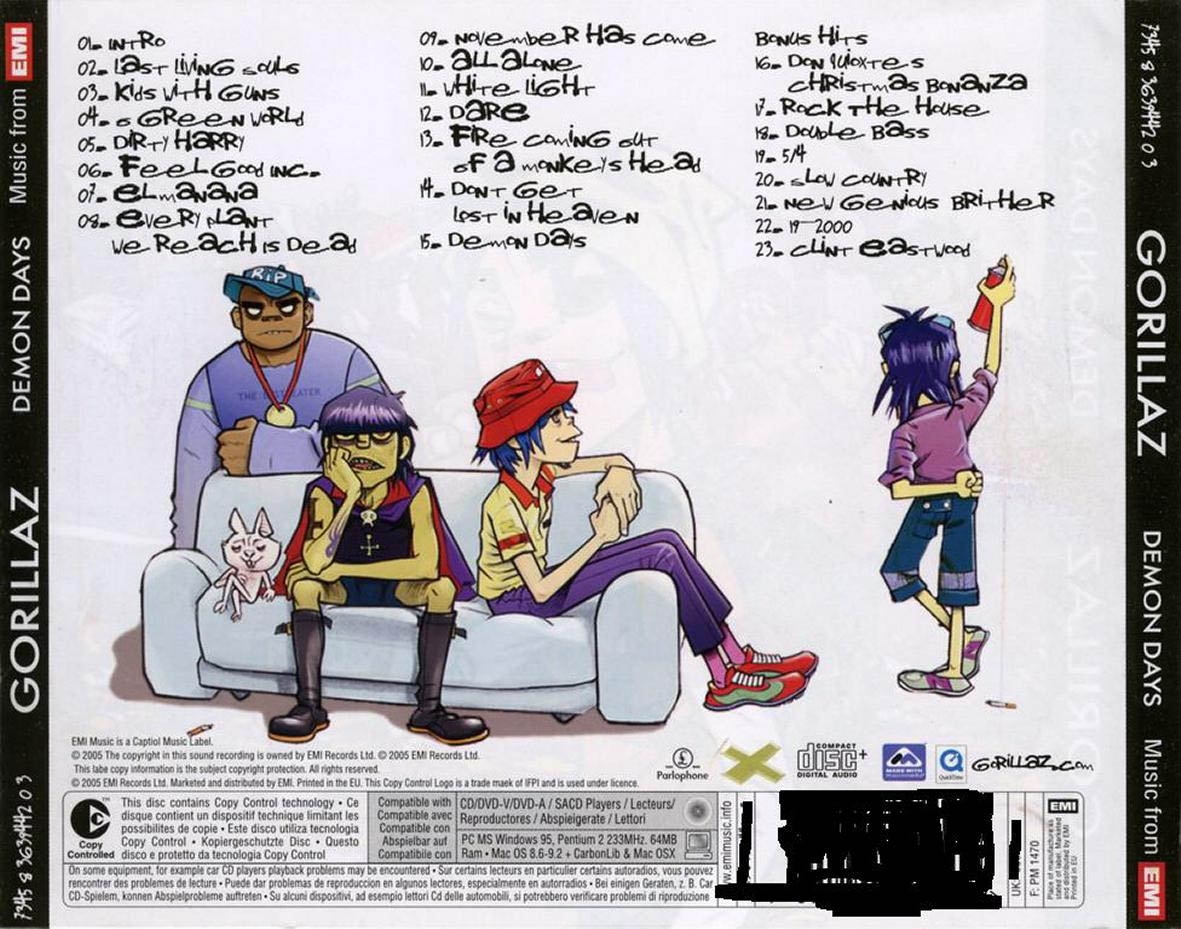

GORILLAZ DEMON DAYS ALBUM BACK TV
Supposedly inspired by a child at his daughter’s school, who innocently brought a knife in to show to his classmates, Kids With Guns dwells on how violent Media and TV will shape up our youth in years to come, convincing poor men and women that enlisting serves some noble purpose, when most wars are driven by greed. After questioning their own existence and place in the world (just as the Western world did in attempting to reassert dominance via the War on Terror), Kids with Guns addresses the apathy and infantilisation surrounding violence and guns, a concern as real and present today, 14 years later, as it was in 2005. For most bands, Last Living Souls would be the highlight of their careers, their greatest musical achievement, but for 2D, Murdoc, Noodle and Russel, it is just the beginning of their Demon Days.ĭrawing comparisons between Demon Days’ tracklist and the everyday concerns of the world in 2005 is essentially unavoidable. It i’s at this point that Albarn desperately shouts the song’s title, caught in this battle between the dub groove (brought by bass player Morgon Nichols) and an increasingly louder drum beat. As the track builds up, more synthesizers and guitars are added to the mix before the track breaks completely and the dub sounds blend into an orchestral-rock soundscape that becomes characteristic of Demon Days.

Gorillaz’ lead singer 2D is a character consumed by anxiety and fear and, in Damon’s bleak vision of the world, his fears are only amplified. As the name suggests, it addresses the theme of loneliness and impending finality of death. In short, a messed- up mirror of our own world rather than a fantastic window into theirs.įittingly, the album opens on a pessimistic tone with Last Living Souls. The result – Demon Days, a record of apocalypse, violence, war, brutality, dystopia and fire. Convinced by the success of their debut album, he decided to use Gorillaz as a means to explore what was going on around him, rather than taking listeners into the fictional world he and Hewlett created for the virtual band. For a very political Albarn, this was the perfect setting to write his dark testament to modern world history and culture. Bush by sending troops into the ground back in 2003, were still very fresh wounds across the UK – those were Demon Days. America’s invasion of Iraq, coupled with Tony Blair’s decision to support George W. The rapid growth of the Internet and the appearance of the first Social Media networks drove the rapid dissemination of Information digitally, real or not. With terrorism growing to never before seen numbers, and torture and executions filling the news, conflict and fear became, once again, part of our world. Demon Days, on the other hand, is a “grown-up” project.ĩ/11 darkened the tone of the world. When Albarn and Hewlett began their cartoon band project and recorded their debut album (in Jamaica, I may add), they were far from imagining the global success that Gorillaz would eventually reach – their main idea was simply to entertain. Even as a kid I often found myself skipping from one track to the other in no particular order, with no particular “flow”. For now it is sufficient to say that, despite being a total game changer, their self-named EP always felt somewhat more like a collection of ideas and fragmented songs rather than a finished album. In due time I will better explore the origins of Damon Albarn and Jamie Hewlett’s cartoon band and the impact their debut album had on the music industry and my life, but this article is not about that, nor is Gorillaz the album we are reviewing. Gorillaz was a 21st century band – a virtual project created for the MTV era, where music videos had gotten us used to the idea that we did not have to see an actual band to listen to their music. The weirdly zen combination of hip-hop, funk, dub and electronic, coupled with Albarn’s distinctive, sorrowful voice, and the cartoons that came with it, revolutionized the game. One of the first records I ever owned was Gorillaz’ eponymous debut album – to be totally honest, it was my older brother’s, but who is writing about it 18 years later? I still remember listening to Clint Eastwood for the first time and being absolutely fascinated by it.


 0 kommentar(er)
0 kommentar(er)
